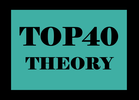If you’re reading this post you likely already know about Top40 Theory, and hopefully you’ve had a chance to check out some of my other posts, and maybe even joined our Facebook group, where you can ask questions and initiate discussions about any pop music theory related topic. But even as I add more and more content to Top40 Theory and try to make it as comprehensive a resource as possible, I don’t believe in one stop shops when it comes to learning about the most widely consumed and least studied music in American culture. Exposure to a variety of perspectives is crucial to gaining a deep understanding of this music.
In this post I list the best music theory resources I am aware of that deal directly with current and recent pop music. My definition of what ‘counts’ as music theory is broader than some other people’s. A lot of musicians—especially beginners—think of technical things like the circle of fifths or chord labeling as the essence of music theory. But for me, music theory simply means thinking about how music works, whether it’s a single song, a genre, or a more universal principle.
The main reason I started Top40 Theory was that I saw a real need among pop songwriters and producers for a music theory resource relevant to their craft. There are a lot of great music theory textbooks, websites, and courses out there, but nearly all of them are fundamentally based on what’s known as common practice music—art music from the 17th-19th centuries. Pop creators need music theory that focuses on the musical principles that all hitmakers know but are never discussed in textbooks.
With that in mind, here is a list of music theory resources that I think you should bookmark/subscribe to and visit frequently. Each of these resources brings something a little different to the table, and since there aren’t that many of them there’s no reason not to check them all out and see if you like them (I think you will).
In this post I list the best music theory resources I am aware of that deal directly with current and recent pop music. My definition of what ‘counts’ as music theory is broader than some other people’s. A lot of musicians—especially beginners—think of technical things like the circle of fifths or chord labeling as the essence of music theory. But for me, music theory simply means thinking about how music works, whether it’s a single song, a genre, or a more universal principle.
The main reason I started Top40 Theory was that I saw a real need among pop songwriters and producers for a music theory resource relevant to their craft. There are a lot of great music theory textbooks, websites, and courses out there, but nearly all of them are fundamentally based on what’s known as common practice music—art music from the 17th-19th centuries. Pop creators need music theory that focuses on the musical principles that all hitmakers know but are never discussed in textbooks.
With that in mind, here is a list of music theory resources that I think you should bookmark/subscribe to and visit frequently. Each of these resources brings something a little different to the table, and since there aren’t that many of them there’s no reason not to check them all out and see if you like them (I think you will).
8 Pop Related Music Theory Resources You Should Subscribe To
1. Switched on Pop (podcast)

2. Holistic Songwriting (YouTube channel)

3. And the Writer Is (podcast)
4. The Pop Song Professor (YouTube channel)
5. Song Exploder (podcast)
6. Song Appeal (podcast)
This is a relatively new podcast by Hunter Farris, who is interested in finding out why we like the music we like. Hunter uses a mix of concepts from music theory and psychology to explore the music he loves—which includes recent and not-so-recent hits—to try and answer this question. Check out his episode about the Zedd/Grey/Marren Morris hit, “The Middle”:
7. How to Write a Hook (blog)
The author of this blog is Adam Hume, a PhD student who researches how songwriters create hooks. How to Write a Hook is still a work in progress and only includes a handful of posts, but there are quite a few things to learn from it if you’re a songwriter. I recommend checking it out here, and I am very interested to see what Adam publishes in the future.
8. Music Theory Bridges (blog)
This is a blog dedicated to applying the music theory concepts you learn in a traditional classroom to pop and rock music. Although the author’s focus is not current pop, he has written about relatively recent hits like Mylie Cyrus’s Wrecking Ball, which is why I bumped him up from the honorable mentions.
Honorable Mentions
If you’re a pop creator, you can and should also benefit from more general music theory, but keep in mind that concepts that are rooted in other genres like classical music or jazz do not necessarily work in pop. However, the more skilled you become and the more you gain fluency in the language of pop, the better you will become at incorporating external concepts into your music without it sounding too forced.
The most fertile ground for public music theory seems to be YouTube. Some of the more prominent ones include Adam Neely, 12tone, and Rick Beato, who cover a number of genres but every once in a while include current pop. If you’re really adventurous you might also want to check out some publicly available online academic publications, such as Music Theory Online and the Journal on the Art of Record Production.
Final Word
I hope you have found this list helpful. If you feel that I’ve missed an important/relevant resource, please feel free to let me know in the comments below or via email, and I'll consider adding it to the list.
Top40 Theory is a project aimed at providing advanced music theory knowledge and composition tools to pop songwriters and producers. Join the small but growing community of highly accomplished songwriters, producers, theorists, and composers at the Top40 Theory Facebook group. You can also follow Top40 Theory’s Twitter account and Facebook page, as well as join the mailing list via the form located in the sidebar, to receive updates about new posts and other pop music theory related musings.
Top40 Theory is a project aimed at providing advanced music theory knowledge and composition tools to pop songwriters and producers. Join the small but growing community of highly accomplished songwriters, producers, theorists, and composers at the Top40 Theory Facebook group. You can also follow Top40 Theory’s Twitter account and Facebook page, as well as join the mailing list via the form located in the sidebar, to receive updates about new posts and other pop music theory related musings.

